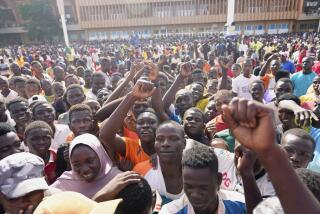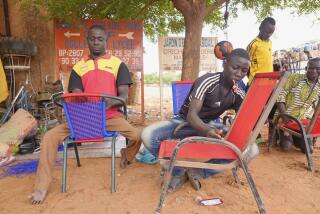Algeria Aims to Crush Rebels, Analysts Say : North Africa: More than 1,000 guerrillas were reportedly killed last week. Militants assassinate editor.
- Share via
PARIS — A major Algerian crackdown on Islamic militants, which reportedly resulted in more than 1,000 rebel deaths last week, appears to be part of an all-out government effort to crush the guerrilla movement and restore order before elections later this year, analysts said Wednesday.
Even as news of the death toll in four Algerian provinces surfaced earlier this week, the Islamic extremists struck a highly visible blow in the heart of Algiers. Mohamed Abderrahmani, editor of the newspaper El Moudjahid, was assassinated, making him the 30th journalist killed in the 3-year-old insurgency.
The government offensive, though not officially confirmed by Algerian authorities, would be the largest military operation against Muslim guerrillas since January, 1992, when the military-backed government canceled elections that the Islamic Salvation Front was expected to win.
An estimated 30,000 people, many of them civilians, have been killed since then by Islamic guerrillas as well as government hit squads.
“The government is increasing the pressure because it is thinking of the elections,” said Ramdane Redjala, an Algerian political analyst in Paris. “It wants the people to feel safe enough in the streets to vote. But it also wants to show that its extremist opponents can be defeated.”
In addition, Redjala said, “the two sides are sizing each other up. This may, in fact, be a first step toward negotiations. But both sides want to negotiate from a strong position.”
This week, Algerian President Liamine Zeroual began a round of new talks with opponents of his military-backed regime on the elections, which he has vowed to hold by the end of the year. Zeroual met with his predecessor, Ali Kafi, head of the independent war veterans, and was scheduled to meet leaders of the main legal opposition parties later this week.
In a move that could suggest a reopening of negotiations, the government moved two top leaders of the Islamic Salvation Front, Abassi Madani and Ali Belhadj, from jail to house arrest for secret talks, Algerian newspapers said.
A similar move by the government last fall failed to break the deadlock, and the men were returned to jail. But this time, eight retired Algerian army generals are drawing up a plan for national reconciliation and dialogue with the front, El Hayat newspaper reported.
Any negotiations, though, will be difficult.
In January, a peace proposal signed by the Islamic Salvation Front and other secular and Muslim groups urged negotiations on a broad-based transitional administration that would lead to democratic elections. It included demands that the government free political prisoners, legalize the front and pledge that the army would stay out of politics.
But the government flatly rejected the plan, saying it intended to oversee elections by year’s end. And it relaunched a crackdown on Islamic guerrillas, prompting the Islamic front to seek stronger alliances with other, more militant opponents of the government.
The Islamic front’s armed wing has targeted security forces in its guerrilla war with the Algerian government. But the government’s primary target has been the more radical Armed Islamic Group, or GIA, whose operatives were responsible for the hijacking of an Air France plane on Christmas Eve and for numerous killings of journalists, intellectuals and foreigners.
The Algerian daily newspaper El Watan, which is generally well-informed on security matters, quoted reliable sources Wednesday as saying that Djamel Zitouni, leader of the GIA, was among those killed in the recent government offensives in mountains west of Algiers.
*
In Paris, Al Ansar, a group close to the GIA, said in a statement Wednesday that a “certain number” of leaders and more than 100 fighters have been killed “by the forces of the ungodly enemy” in that region. But the statement carried the signature of Abu Abderrahmane Amine, a pseudonym used by Zitouni.
Zitouni, who is believed to be in his 20s, took command of the GIA in September, when GIA leader Cherif Gousmi and one of his lieutenants were killed in a gun battle in Algiers.
In a protest against the slaying of journalists, 16 Algerian daily newspapers from across the political spectrum appeared Tuesday under the heading El Moudjahid, the name of the paper run by Abderrahmani, who was killed Monday.
“The crisis facing journalists here is without parallel anywhere in the world,” wrote Omar Belhouchet, editor of El Watan and himself the target of two assassination attempts.
The killing of Abderrahmani was part of a guerrilla strategy to intimidate journalists and create disorder in the country, analysts said. Abderrahmani’s paper had recently written several articles sympathetic to the Algerian government.
“The GIA wants to show that it can return blow for blow,” said Redjala, the analyst in Paris. “This killing belongs to the logic of the infernal cycle in Algeria, where repression leads to terrorist act and terrorist act leads to repression.”
The difficulty of reporting what is happening in Algeria is illustrated by the conflicting reports about the government offensive.
The estimates of government and guerrilla deaths range from 500 to 2,500. Newspapers said the offensives were launched when as many as 1,500 militants of the GIA met to organize “shock operations” against rural communities.
Times Paris Bureau researcher Sarah White contributed to this report.
More to Read
Sign up for Essential California
The most important California stories and recommendations in your inbox every morning.
You may occasionally receive promotional content from the Los Angeles Times.














